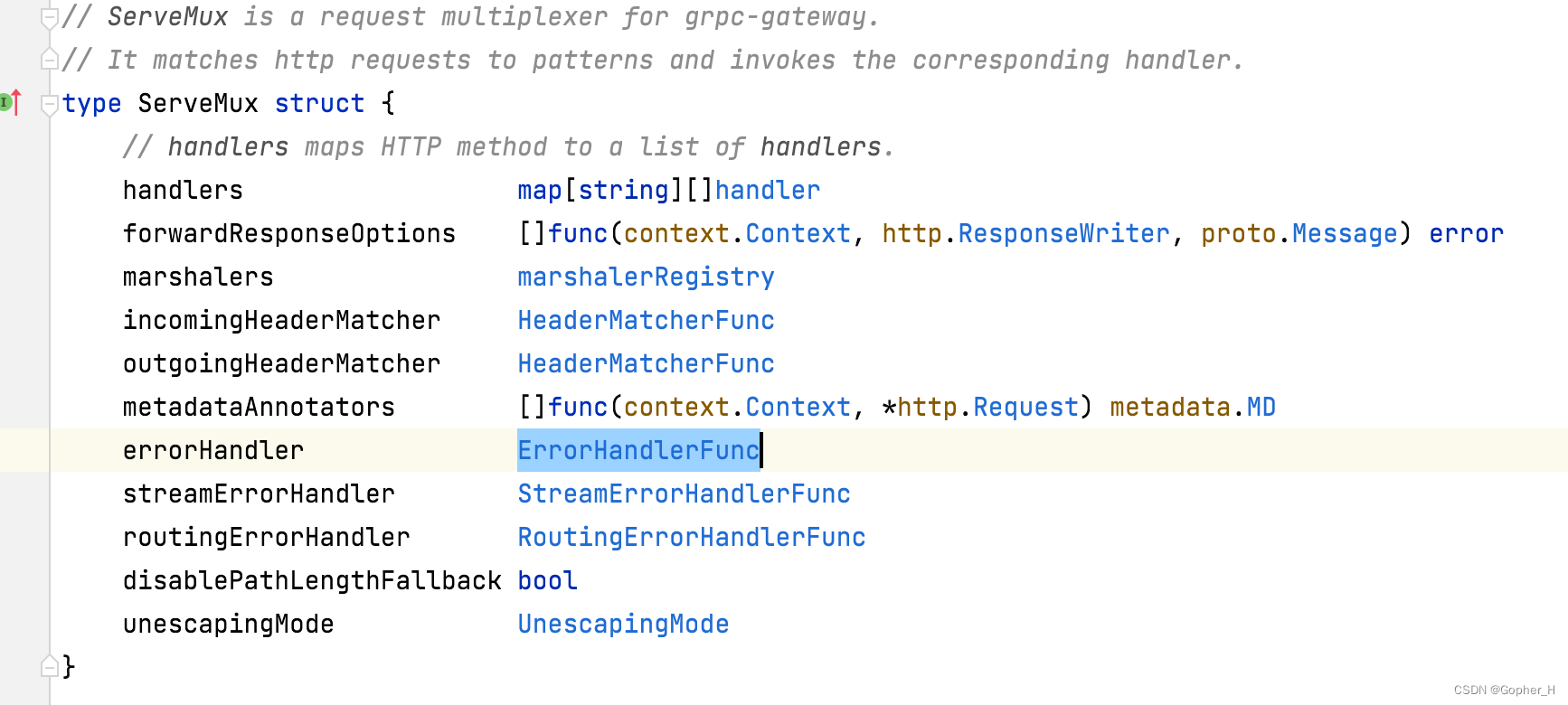文章目录
前言
我们知道grpc 接口返回是有两个参数的 一个是 data,而另一个就是error,但是转成http 之后这个error 应该怎么办呢?所以咱们需要对grpc 的error 进行统一的错误处理。
当然grpc- gateway里面是又默认的数据格式,可是有些时候我们并不满足这种格式所以我们得自定义。
一、 With.ErrorHandlerFunc
咱们先看 ServerMux中有哪些hooks

这是 grpc-gateway 的请求多路复用器。它将 http 请求与模式匹配并调用相应的处理程序,咱们今天需要用到的就是 errorHandler
- 查看默认的错误处理 是怎么样的
下面是截取了 grpc- gateway中的errors.go 文件中的默认错误处理代码
上面是对请求头做了一些处理,以及获取了error 的信息 然后在通过 HTTPStatusFromCode 去对于请求状态的一个改变,然后使用WriteHeader 函数写入本次请求的状态码,Write写入出去的值,那么上面是简单的介绍Default 操作是怎么做的,接下来我们自定义一个HTTPErrorHandler。// DefaultHTTPErrorHandler is the default error handler. // If "err" is a gRPC Status, the function replies with the status code mapped by HTTPStatusFromCode. // If "err" is a HTTPStatusError, the function replies with the status code provide by that struct. This is // intended to allow passing through of specific statuses via the function set via WithRoutingErrorHandler // for the ServeMux constructor to handle edge cases which the standard mappings in HTTPStatusFromCode // are insufficient for. // If otherwise, it replies with http.StatusInternalServerError. // // The response body written by this function is a Status message marshaled by the Marshaler. func DefaultHTTPErrorHandler(ctx context.Context, mux *ServeMux, marshaler Marshaler, w http.ResponseWriter, r *http.Request, err error) { // return Internal when Marshal failed const fallback = `{"code": 13, "message": "failed to marshal error message"}` var customStatus *HTTPStatusError if errors.As(err, &customStatus) { err = customStatus.Err } s := status.Convert(err) pb := s.Proto() w.Header().Del("Trailer") w.Header().Del("Transfer-Encoding") contentType := marshaler.ContentType(pb) w.Header().Set("Content-Type", contentType) if s.Code() == codes.Unauthenticated { w.Header().Set("WWW-Authenticate", s.Message()) } buf, merr := marshaler.Marshal(pb) if merr != nil { grpclog.Infof("Failed to marshal error message %q: %v", s, merr) w.WriteHeader(http.StatusInternalServerError) if _, err := io.WriteString(w, fallback); err != nil { grpclog.Infof("Failed to write response: %v", err) } return } md, ok := ServerMetadataFromContext(ctx) if !ok { grpclog.Infof("Failed to extract ServerMetadata from context") } handleForwardResponseServerMetadata(w, mux, md) // RFC 7230 https://tools.ietf.org/html/rfc7230#section-4.1.2 // Unless the request includes a TE header field indicating "trailers" // is acceptable, as described in Section 4.3, a server SHOULD NOT // generate trailer fields that it believes are necessary for the user // agent to receive. doForwardTrailers := requestAcceptsTrailers(r) if doForwardTrailers { handleForwardResponseTrailerHeader(w, md) w.Header().Set("Transfer-Encoding", "chunked") } st := HTTPStatusFromCode(s.Code()) if customStatus != nil { st = customStatus.HTTPStatus } w.WriteHeader(st) if _, err := w.Write(buf); err != nil { grpclog.Infof("Failed to write response: %v", err) } if doForwardTrailers { handleForwardResponseTrailer(w, md) } }
二、自定义HTTPErrorHandler
1.使用runtime.NewServeMux

errorHandler 就是我们需要自定义的错误处理函数,通过WithErrorHandler 去初始化Mux 中的 errorHandler
2.errorHandler 函数编写
func errorHandler(_ context.Context, mux *runtime.ServeMux, marshaler runtime.Marshaler, writer http.ResponseWriter, request *http.Request, err error)
我们先定义一个统一的返回数据结构体并初始化
var resp = &utils.Response{
Success: false,
ErrorCode: 500,
Message: "",
Data: nil,
}
将error进行解析然后赋值给resp 设置请求头content-type
s := status.Convert(err)
pb := s.Proto()
resp.Message = pb.GetMessage()
resp.ErrorCode = pb.GetCode()
contentType := marshaler.ContentType(pb)
writer.Header().Set("Content-Type", contentType)
下面就是对结构体进行Marshaler
buf, merr := marshaler.Marshal(resp)
if merr != nil {
grpclog.Infof("Failed to marshal error message %q: %v", s, merr)
writer.WriteHeader(http.StatusInternalServerError)
if _, err := io.WriteString(writer, fallback); err != nil {
grpclog.Infof("Failed to write response: %v", err)
}
return
}
下面就是对 code码进行一个转换 ,查找相应的http 状态码
st := utils.HTTPStatusFromCode(s.Code())
writer.WriteHeader(st)
if _, err := writer.Write(buf); err != nil {
grpclog.Infof("Failed to write response: %v", err)
}
func HTTPStatusFromCode(code codes.Code) int {
switch code {
case codes.OK:
return http.StatusOK
case codes.Canceled:
return http.StatusRequestTimeout
case codes.Unknown:
return http.StatusInternalServerError
case codes.InvalidArgument:
return http.StatusBadRequest
case codes.DeadlineExceeded:
return http.StatusGatewayTimeout
case codes.ResourceExhausted:
return http.StatusTooManyRequests
case codes.FailedPrecondition:
return http.StatusBadRequest
case codes.OutOfRange:
return http.StatusBadRequest
case codes.Unimplemented:
return http.StatusNotImplemented
case codes.Internal:
return http.StatusInternalServerError
case codes.Unavailable:
return http.StatusServiceUnavailable
case codes.DataLoss:
return http.StatusInternalServerError
}
grpclog.Infof("Unknown gRPC error code: %v", code)
return http.StatusInternalServerError
}
错误演示:

总结
以上就是对于grpc-gateway 通过 runtime.WithErrorHandler 进行统一错误处理。但是这里面并没有对与成功的请求做一个数据格式包装,如果想对正确的请求做一个数据包装一般在网关那层进行处理。
本文含有隐藏内容,请 开通VIP 后查看